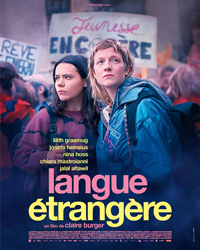Tongues Untied: Love Lies Easy in Burger’s Cross Culture Coming of Age Drama
 There’s a lot going on in Claire Burger’s third film, Foreign Tongue (though the original French language title, Langue Étrangère, more simply means ‘foreign language’). It’s an intergenerational, cross-cultural, lesbian coming-of-age film using a rather simplified lens to examine complex contemporary issues. A rare French-German co-production, Burger, writing alongside Léa Mysius, explores two pen pals from Strasbourg and Leipzig, tossed together thanks to a language exchange program which initially seems more trouble than it’s worth based on both their current family dramas. But some unexpected drama ensues, followed by and salvation through a little love and tenderness. Overtly, Burger makes some rather pointed comparisons between these two distinct cultures examining how truth and transparency may be necessary for our survival, but doing the right thing is always easier said than done.
There’s a lot going on in Claire Burger’s third film, Foreign Tongue (though the original French language title, Langue Étrangère, more simply means ‘foreign language’). It’s an intergenerational, cross-cultural, lesbian coming-of-age film using a rather simplified lens to examine complex contemporary issues. A rare French-German co-production, Burger, writing alongside Léa Mysius, explores two pen pals from Strasbourg and Leipzig, tossed together thanks to a language exchange program which initially seems more trouble than it’s worth based on both their current family dramas. But some unexpected drama ensues, followed by and salvation through a little love and tenderness. Overtly, Burger makes some rather pointed comparisons between these two distinct cultures examining how truth and transparency may be necessary for our survival, but doing the right thing is always easier said than done.
Fanny (Lilith Grasmug) is a troubled seventeen-year-old girl traveling from Strasbourg to Leipzig, where she will stay a month at the home of her pen pal, Lena (Josefa Heinsius) as part of a language exchange trip between their schools. However, Lena is dismayed at the arrival of Fanny, seeing as it comes during a time where her mother Susanna (Nina Hoss) is still having a hard time getting over a recent break-up. Slowly, the girls warm up to one another, and romance blossoms. When it’s Lena’s turn to visit Fanny’s home, where her mother Antonia (Chiara Mastroianni) and father Anthar (Jamal Altawil) are having their own issues, she slowly begins to realize Fanny is a pathological liar, leading them down a potentially dangerous road as they search for a girl Fanny claims is an older sister, a protestor she has photographs of.
The success of the film rests almost entirely on the performances of Lilith Grasmug and Josefa Heinsius, who are reminiscent of both Virginie Ledoyen and Sairose Ronan, respectively. Fanny’s chilly reception leads to a slow, hard won build between the two of them, beginning with a resistance towards each other’s languages. Lena is quick to note Fanny’s need for kindness, however, when she learns of a suicide attempt from two months prior due to school bullying. There’s also some tension back home due to Fanny’s biracial heritage as French-Arabic. However, Lena doesn’t realize Fanny has a penchant for white lies and exaggeration, something easy to overlook as their friendship takes on a sexual dimension after partying with shrooms.
In the film’s first Leipzig-set leg, the narrative is aided significantly by a scene-stealing Nina Hoss, who’s been leaning on white wine to deal with a recent break-up, informing the film’s best scene at a luncheon where Hoss loses control. This, of course, is in direct opposition to Fanny’s mother and father, who are less into direct communication than reactionary hand wringing (which leaves Chiara Mastroianni and Jamal Altawil with little do as characters, each defined by professions which underline the film’s themes rather than fleshing out the narrative). As such, Foreign Tongue loses steam when we get to Strasbourg and Fanny’s lying spins out of control. Burger and Mysius seem to be leaning into the suggestion Fanny could fall headlong into radicalization, fascinated as she seems to be with Antifa and the Black Bloc. However, all’s well that ends well, it would seem, eventually.
French culture seems to harbor all of the film’s darker subtexts, a country which, in the parameters of this film, hasn’t dealt with its corrosive issues on police violence, workers’ rights, racial disparity, etc. In opposition, based on the history less in Lena’s classroom regarding the fall of the Berlin Wall, Germany stands stronger in its embrace of transparency, even when it’s uncomfortable, after decades of extreme dysfunction. Unfortunately, these points of comparison feel too superficial, and often overwhelms the more intimate relationship building between Fanny and Lena. Likewise, the film suggests Susanne and Antonia were also friends as young women, but this dimension is never satisfactorily addressed. A score from Rebeka Warrior, which spins a theme around the budding romance, is an effective touch, while bit parts from Julie Ledru (Rodeo, 2022) and Samuel Theis, one of Burger’s co-directors on 2014’s Party Girl (and also recent star of Anatomy of a Fall, 2023) adds to the film’s ensemble texture.
Reviewed on February 19th at the 2024 Berlin International Film Festival – Main Competition section. 105 mins.
★★½/☆☆☆☆☆


